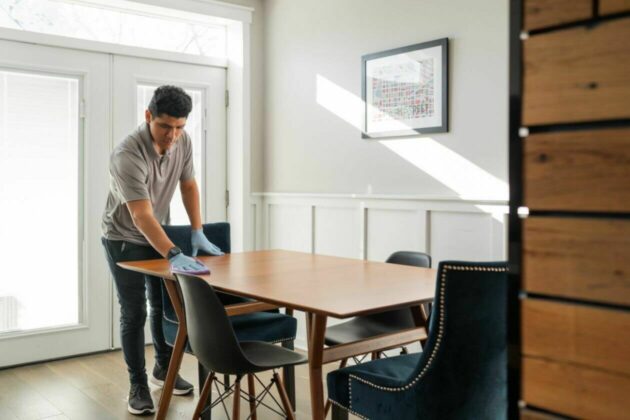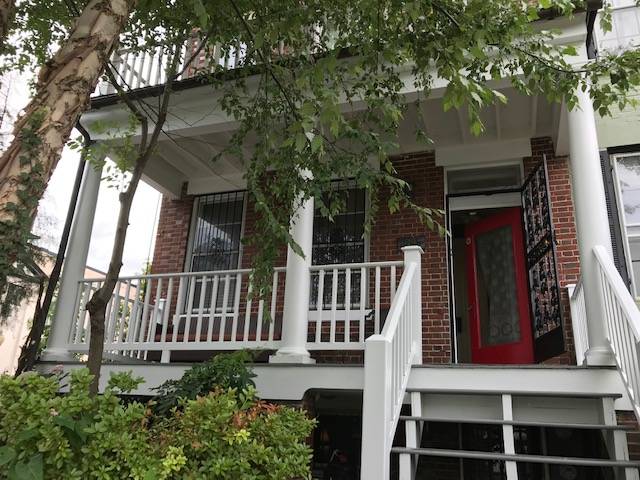“Dear PoPville,
In March we had to file a lawsuit against the house flippers who sold us our house. Turns out they had illegally renovated our house. The flipper did not even have a D.C. business license. He runs approximately 15 limited liability corporations (LLCs) out of his $2 million house in Potomac, Maryland. Like some (but not all) other house flippers, he runs the house flipping LLCs like shell companies, undercapitalizing them, mixing his personal assets with the LLC assets, and failing to hold any board meetings or to otherwise respect the formal rules that govern LLCs. Those shell companies essentially protect him from liability and make it hard to find out who is behind the shoddy construction. We fully expect that the LLC he used to flip our house has no insurance and no money in it. That means that if we want to recover our losses, our attorney will have to “pierce the corporate veil” of the flipper’s LLC (a potentially expensive proposition) and show that he was using the LLC as an alter ego, that he didn’t respect the rules governing LLCs, and that he was using the LLC to perpetrate fraud.
In addition, the real estate firm for the seller/flipper was not registered and was not in good standing (and thus was also operating illegally in D.C.), and the contractor also had no license and used unlicensed subs.
Examinations of the D.C. Department of Consumer and Regulatory Affairs (DCRA) building permit records, deeds in the D.C. Recorder of Deeds, pre-flip real estate listings and then post-flip listings strongly suggest that the same flippers who did our house have also illegally renovated dozens of other homes in D.C. They’ve covered up their tracks well, in part by using permits for minor repair work while they greatly exceeded the permits and gutted the place amid a total rehab. Their carefully hidden illegal work includes the tearing down of load-bearing walls or columns to create a superficially nice but structurally defective and non-code compliant open floor plan, floors that sag two inches or more, an asbestos-contaminated HVAC system, a now-collapsing porch built by draping brand new casing over thoroughly rotten wood, a construction-debris-filled sewer line that will likely spew sewage into our basement yet again soon unless we excavate the pipe to replace the whole thing, zero insulation in the walls and ceilings, and several other problems. We plan to keep the house, but we know that if we ever want to be able to sell the house in the future, we will have to disclose all these problems, will have to undertake a significant redo of the house, and be able to show prospective buyers documentation regarding how we fixed each defect.
Having to move out of our own house for safety reasons and rent an apartment while still paying a mortgage is not the best thing that’s ever happened to us. But we were fortunate to discover all the well hidden latent defects and the failures to obtain the required permits in time to hold the flippers accountable before it was too late (before the three-year statute of limitations). From a search of a few dozen hours of the DCRA permits records, deeds, and other city documents and records, it appears that dozens of other individuals in D.C. (as well as DCRA, tax authorities, lenders/banks, insurance companies, etc) were similarly defrauded, bought homes from these guys and — whether they know it or not yet — also ended up with houses that were partially or in large part illegally renovated, not inspected properly (or at all), built by unlicensed contractors, affected by artificially inflated values, and unsafe.
I know you cannot name the flipper and his partners in crime due to liability reasons, but if interested, readers can look up the defendants in our civil suit online via the D.C. Superior Court case search system; our civil case number is 2014 CA 001722B. More importantly, even though many of your readers already know this, I’m also writing to serve as a reminder that there are many greedy individuals who continue to successfully take full advantage of D.C.’s weak regulatory system and have turned D.C. into a veritable Wild West of U.S. real estate. The story is not simply about artificially inflating the value of houses and some home buyers who are whining about getting taken. It’s about real estate and regulatory systems that are allowing shady flippers to dot the D.C. skyline with houses that are unsafe to live in. Our story appears to be the tip of the iceberg.
The story of what flippers can hide and get away with in D.C. is pretty amazing: no license/registration, no permits, no problem. The fact that we did a quick check to ensure they had permits before buying the house didn’t help (they had permits, but they were for relatively minor repair work, not for the complete-gut-and-redo job they did on the house). And the house inspector we hired before we bought the house didn’t stand a chance at finding the things they hid well behind new drywall, under gleaming bamboo floors, new carpeting, etc.
So the story appears to be much bigger than our illegally and badly renovated house, unfortunately. DCRA’s Consumer Protection Office and Inspections/Compliance Office have helped us a lot so far in investigating the defendants in our lawsuit and putting them under a lot of pressure to settle. It’s too bad, though, that DCRA cannot do more on the front end (via prevention-related regulation) to more effectively prevent this kind of thing.
The real estate market represents an essential money-maker for the city of D.C. And of course not all flippers are bad; many help improve neighborhoods. But after having spent the better part of the last six months digging up the dirt on the dirty flippers of D.C., seeing how often they get away with the same scams (even after getting slapped with stop work orders), navigating the D.C. regulatory bureaucracy, etc, it would seem that D.C. needs to undertake several reforms to address this problem before it gets even worse. Some of these reforms might include:
- Stiffer penalties for building permit violations, including the establishment of daily fines instead of one-off fines;
- Speeding up and simplifying the process of applying for building permits so as to entice flippers not to skip the permits or cut corners;
- Hiring more inspectors;
- Expanding D.C.’s valiant but still-too-small Consumer Protection Office, and the adoption of needed implementing regulations so that the office can finally levy fines for false advertising;
- Ensure that violations regarding permits and inspections are also recorded by the Recorder of Deeds;
- Increase penalties for and obstacles to remove Stop Work Orders issued against un-permitted house renovators;
- Doing away with or greatly strengthening and spot checking the laughable third-party inspection system through which DCRA outsources its inspection duties to private contractors with little to no oversight;
- Stronger seller disclosure statements to force those who give flipping a bad name to reveal what they knew about the house’s defects, and to list explicitly which permits and inspections they obtained;
- A DCRA-sponsored amnesty period (followed by a robust crack-down) to entice unlicensed flippers and/or contractors to turn themselves in and report and remedy their un-permitted (and thus unsafe) houses;
- The establishment of a fund akin to the Guarantee Fund that Maryland has to compensate homeowners from losses due to poor workmanship;
- Requirements that title insurance searches uniformly include permit records, not just deeds;
- Better training for appraisers from the Office of Tax and Revenue, who often do not even go into a house to assess it;
- Requiring the disclosure of beneficial ownership information on permit applications and real estate listings, to ensure that flippers cannot trot out a new LLC every week to hide their bad reputations behind a new unknown company or LLC;
- Adjusting the legislation that allows for piercing the corporate veil, so that in situations where patterns of fraud are clear, citizens trying to sue the shady flippers of D.C. don’t get stuck pursuing an uncapitalized, penniless shell company while the owner enjoys his/her ill-gotten profits and impunity;
- Increasing regulatory cooperation and joint investigations between D.C., Maryland and Virginia, as well as applying penalties region-wide to repeat-offenders of un-permitted, unsafe house flipping; and
- Harsher tax fraud penalties, including for those flippers who claim un-permitted renovations or improvements as tax deductions. “
A lot of readers may believe that it’s not a big deal if permits for renovations are obtained, or that it’s not a big deal to buy a house with work that was done without permits. Many might believe that “well, if the work is safe enough or is done to code, it’s merely the bureaucracy that’s being shortchanged…and besides, the D.C. bureaucracy is notoriously slow and charges too much for permits.” I may have even once been sympathetic to that line of thinking. Not anymore. While I cannot sing the praises of DCRA’s consumer protection and compliance divisions enough in terms of how they have aggressively gone after these crooked flippers and shared with us some excellent insights and their time in effort to help us, DCRA was nonetheless required to glue a big bright orange sticker (the scarlet letter of D.C. housing) on our front door and require us to fix what the flippers did (or rather didn’t do). And if we don’t get it fixed promptly, we actually risk having the house confiscated and/or being prosecuted by the attorney general (per the bright orance notice now pasted on our front door), I changed my opinion pretty quickly.
To engage in a bit of mythbusting, it’s worth pointing out that work by private contractors is almost never done to code if there is no ‘threat’ of being scrutinized or inspected. But even if un-permitted work is done to code, if you end up owning a house that features work that was done without permits (and inspections), the city can and will slap a stop work order on your house along with a Notice of Violation / Notice to Abate and hold you (the owner) responsible for ensuring that the work is permitted, inspected, and code-compliant as required — even if they know it was the house flippers who did the wrong thing. This is what happened to us; we risk having the house repossessed by the D.C. government if we do not fix what the flippers did. At the risk of sounding like a public service announcment, even if you have no problems (or are not aware of the problems) and have not been tagged by the city government as having a house with un-permitted work, you could still encounter problems. For example, when you sell such a house (with un-permitted work), buyers and/or banks (lenders) may ask for proof of proper permits regarding changes to the house that they’ve identified after digging in the records (research). And it can cost quite a bit to fix things retrospectively, especially when no architectural plans were filed (because no structural-work permits were applied for) and everything is covered up with drywall, etc.
Recent Stories

Photo by Beau Finley Ed. Note: If this was you, please email [email protected] so I can put you in touch with OP. “Dear PoPville, Him, dapper chap with a light…

For many remote workers, a messy home is distracting.
You’re getting pulled into meetings, and your unread emails keep ticking up. But you can’t focus because pet hair tumbleweeds keep floating across the floor, your desk has a fine layer of dust and you keep your video off in meetings so no one sees the chaos behind you.
It’s no secret a dirty home is distracting and even adds stress to your life. And who has the energy to clean after work? That’s why it’s smart to enlist the help of professionals, like Well-Paid Maids.

Unlock Peace of Mind for Your Family! Join our FREE Estate Planning Webinar for Parents.
🗓️ Date: April 25, 2024
🕗 Time: 8:00 p.m.
Metropolitan Beer Trail Passport
The Metropolitan Beer Trail free passport links 11 of Washington, DC’s most popular local craft breweries and bars. Starting on April 27 – December 31, 2024, Metropolitan Beer Trail passport holders will earn 100 points when checking in at the
DC Day of Archaeology Festival
The annual DC Day of Archaeology Festival gathers archaeologists from Washington, DC, Maryland, and Virginia together to talk about our local history and heritage. Talk to archaeologists in person and learn more about archaeological science and the past of our






